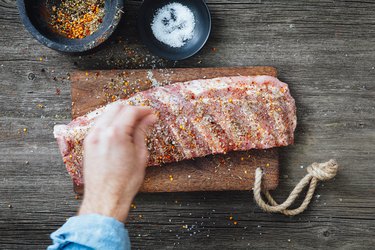
Advertisements touting pork as lean are accurate for some cuts, but remember this: They're not talking about baby back ribs. To qualify as "lean," pork must contain 10 grams or less of total fat per serving. Pork baby back ribs have nearly double that amount.
But if you watch portions and keep total fat intake within your daily goals, you'll gain some significant nutritional benefits. Baby back ribs nutrition includes protein, B vitamins, zinc and selenium.
Video of the Day
Video of the Day
Where Do Baby Back Ribs Come From?
Pork back ribs come from the shoulder section of the pork loin. They're called baby back ribs because the bones in this area are smaller than the bones in spareribs. The parasite associated with undercooked pork — Trichanella spiralis — has been virtually eliminated, reports Michigan State University.
However, you still need to cook pork well enough to ensure your safety. Cook the ribs to an internal temperature of 145 degrees Fahrenheit and let the meat sit for three minutes. During the three minute rest, the temperature continues to climb, which kills bacteria without overcooking the ribs.
Read more: 19 Ways to Improve Your BBQ
Pork Baby Back Ribs Nutrition
Per 3-ounce serving, pork baby back ribs contain:
- Calories: 248
- Fat: 18 grams
- Protein: 20 grams
A 3-ounce serving of roasted baby back ribs contains 20 grams of protein. This amount supplies 40 percent of the daily value based on consuming 2,000 calories per day. However, the protein comes with 18 grams of total fat. When you eat 3 ounces of pork baby back ribs, you'll consume 248 calories.
Fat contributes 162 of the total calories. You'll also get 6.6 grams of saturated fat and 71 milligrams of cholesterol. The American Heart Association recommends limiting cholesterol to no more than 300 milligrams daily and saturated fats to less than 7 percent of your daily calories.
They also provide the two following health benefits:
1. Contain Beneficial B Vitamins
Based on a 2,000-calorie-a-day diet, one serving of baby back ribs provides at least 10 percent of the daily value for six of the eight B vitamins. All the B vitamins help metabolize food into energy, but two that you'll get from pork ribs — vitamins B-6 and B-12 — also protect your arteries.
They convert the amino acid homocysteine into other beneficial amino acids. If you don't consume enough of both vitamins, the amount of homocysteine in your blood increases and high levels can damage your arteries, according to FamilyDoctor.org.
Read more: Foods That Are High in B Vitamins
2. Support Immune System Function
Selenium and zinc are both essential for your immune system. Selenium helps initiate the immune response and regulates inflammation, according to a 2012 study published in Antioxidants and Redox Signaling. Zinc ensures the normal development of specialized immune cells. Selenium also helps produce thyroid hormones and an important group of antioxidants.
Zinc's other roles in your body include synthesizing DNA, regulating cell growth and forming the structure of proteins. A 3-ounce serving of pork baby back ribs provides 39 percent of your daily value of selenium and 17 percent of the daily value for zinc.
- USDA National Nutrient Database: Pork, Roasted, Cooked, Separable Lean and Fat, Backribs, Fresh
- USDA Food Safety and Inspection Service: A Guide to Federal Food Labeling Requirements for Meat and Poultry Products
- Pork: Be Inspired: Back Ribs
- Michigan State University: Pork Does Not Have to be Well Done
- American Heart Association: Know Your Fats
- MedlinePlus: B Vitamins
- FamilyDoctor.org: Coronary Artery Disease: High Homocysteine Level: How It Affects Your Blood Vessels
- Antioxidants and Redox Signaling: The Role of Selenium in Inflammation and Immunity: From Molecular Mechanisms to Therapeutic Opportunities
- Linus Pauling Institute: Selenium
- Office of Dietary Supplements: Zinc